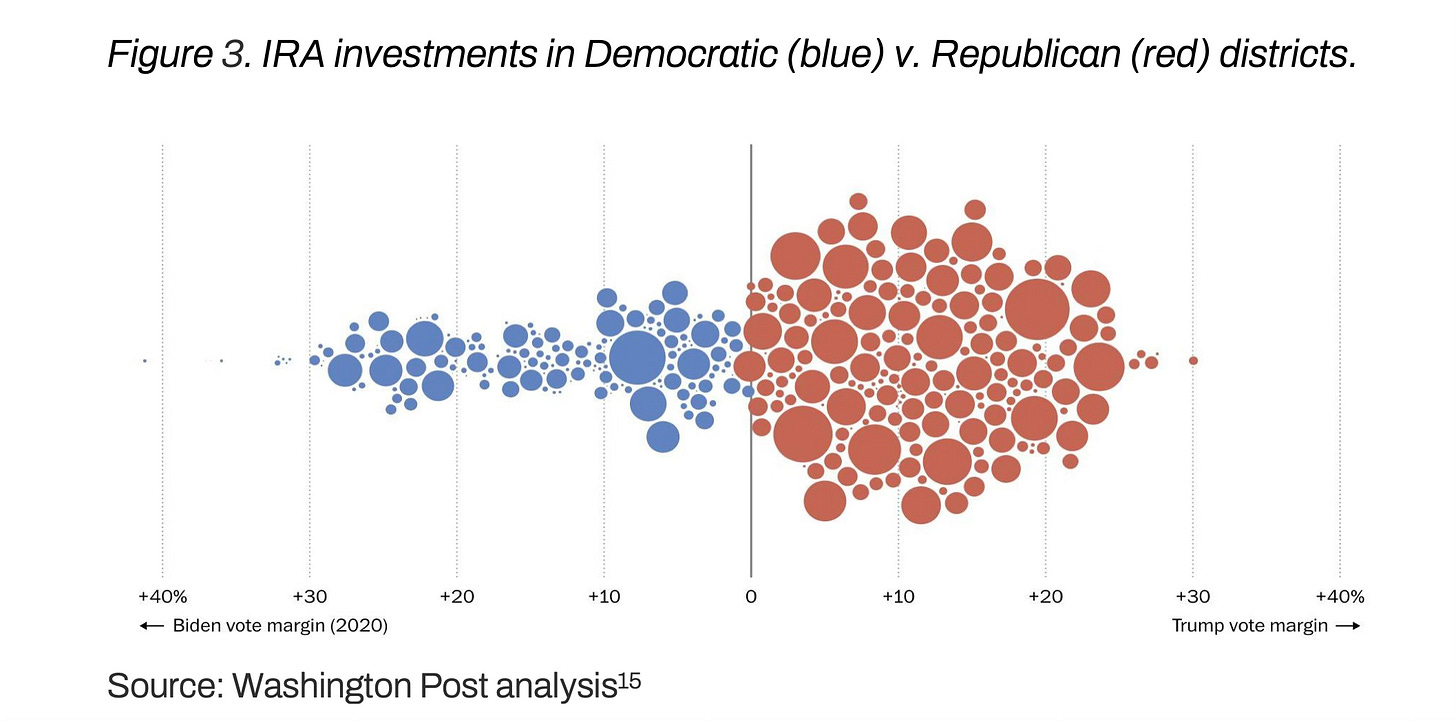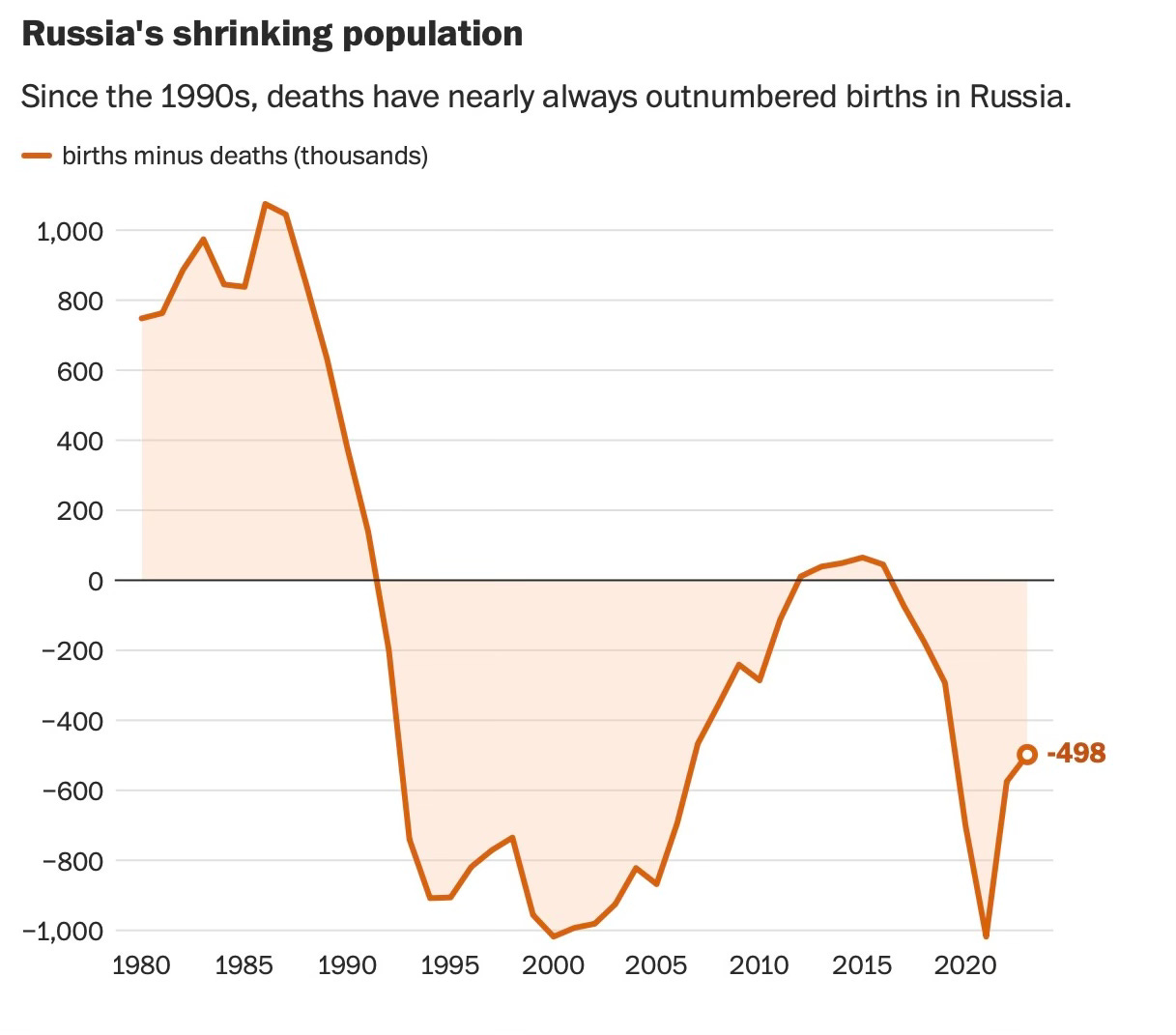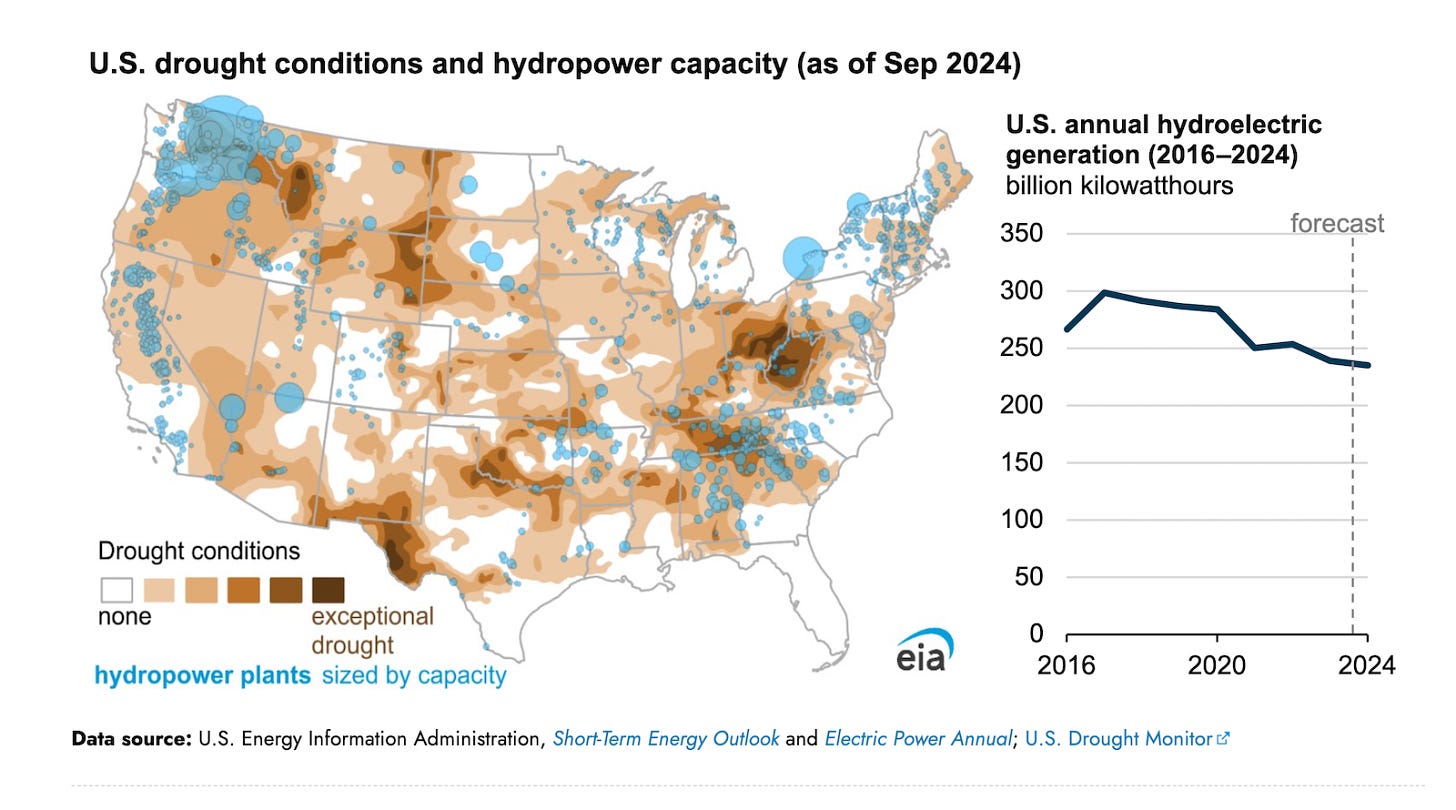1) Who wins the climate peace?
NET ZERO INDUSTRIAL POLICY LAB: Trump’s proposed clean energy retreat: US costs and global rewards
The gist:
Analysis shows disincentivizing US solar and battery manufacture could cost billions and open new supply chain markets for competitors.
The problem with selling nostalgia as vision: you’re prepping for last century’s competitions and economics. I mean, it’s kind of weird when the Saudis and Emiratis are prepping hard for a post-fossil fuel world and America seems dead set on expanding it’s already top global position in producing oil and gas.
To which future exactly are we heading? The one ahead or the one behind?
We know Trump wants to reverse EVERYTHING Biden ever did — on the principle of I won and now you lose, but …
The Biden Administration’s investments in climate leadership across the CHIPS Act, the Bipartisan Infrastructure Law (BIL) and the Inflation Reduction Act (IRA) have shifted the landscape of US and global clean energy supply chains. The IRA has created over $200 billion in clean energy investment inside the United States. CHIPS and the Bipartisan Infrastructure Law created new government offices to support scientific and technological development. This kind of action is badly needed for the US to compete with China and regain a position in emerging clean energy supply chains.
Repealing the IRA basically just shifts $80B worth of renewable energy manufacturing to the rest of the world — meaning, mostly China. What does America get in return? Harm “in the form of lost factories, lost jobs, lost tax revenue, and up to $50 billion in lost exports.”
There is no economic reality where that constitutes “winning.”
China will be happy to wave in the rearview mirror of one of its world-leading EVs, as US manufacturers hobble on.
The starting pistol already went off.
The clean energy transition represents an enormous opportunity. Looking at just the four biggest clean technologies, the addressable market is projected to grow to $263 billion in annual revenues.
The IRA has jumpstarted US industry to take advantage of this opportunity. Hundreds of projects across the solar, wind, and battery supply chains have been announced or are under construction.
The only question is, are we going to compete or not?
Drill, baby, drill! is an infantile response. I mean, just point your real pistol at your foot and pull the trigger.
Here are the others out there who will be made “great” by this entirely un-strategic move:
The absolute kicker? Repealing IRA will disproportionately hurt Republican districts:
Pray Trump fails, but only if you’re more interested in America winning than Dems “losing.”
2) Show me the other money!
SUMSUB: Global Fraud Index 2024
An interesting site with tons of charts.
The one that caught my eye in terms of globalization and history:
Think of globalization as starting initially with Europe’s colonialization of the rest of world: thus, no surprise that Europe is farthest along in its rules/fraud protection.
The Americas come next because they were the most pervasively colonized (e.g., we only speak European languages today) and the first to break off from that process — far earlier than either Asia or Middle East/Africa.
Asia-Pacific is the riser now, so lines up in third place, leaving the most-prolonged colonized areas in last place.
So, yeah, I do disagree with this year’s Nobel in economics: the key isn’t the spread of great institutions and laws via colonialization but rather how fast/early you put that exploitative relationship in your rear-view and recovered from its abuse.
European colonialism = bad globalization, US-style free-trade-based globalization = far better.
3) Putting the mother back in the motherland
WAPO: Russia is shrinking; the Kremlin says child-free ideology is to blame
Russia has come up with the equivalent of Hollywood’s old Hays Code regarding proper social messaging around naturism:
A new law against “child-free propaganda” criminalizing the spread of information advocating for not having children has sailed through the lower house of parliament. The nature of the “propaganda” is not explicitly defined, so the law could bar advertisers, movie and TV producers, bloggers, and writers from presenting childless people as satisfied, or large families as miserable, according to rights groups and activists.
The Hays Code was developed in the 1930s to curb the pernicious effect of bad behavior being portrayed on the silver screen. There were many no-nos:
Good luck with this approach:
Russian ministers have called on women to start families at age 18, while others have condemned women who have pursued higher education before giving birth.
But it must be done, it seems, because Putin is “haunted” by the lack of babies.
He should be. It’s a huge referendum on his mismanagement of the Russian economy and ruination of its politics.
4) Beloved or be-feared?
WAPO: Americans elected Trump. They might not like what comes next.
Mass deportations, pardoning J6 convicts, torching the civil service (the great achievement of the Progressive Era), tariffs, starving Ukraine’s military effort, going after political rivals and vaccines … all hugely popular with the MAGA crowd but all decided unpopular on a national scale.
The danger of willfully misreading an alleged “mandate.”
Won’t be the first time.
5) Splitting the bill
REUTERS: Daily Briefing
Pretty much my book in a nutshell: the drying out of the lower latitudes (Middle Earth), home to the vast bulk of low-income countries. Wild rain happening to everyone (temperate zones becoming just as intemperate). Hurricanes “costing” the better-to-do because they love their shorelines.
The water stuff makes you retreat and build back better, but the droughts? They wear you out and send you packing. Droughts crush your soul.
6) The long reach of Chinese law
NYT: He Made a Daring Escape From China. Then His Real Troubles Began.
A long sad tale of a Uyghur man who fled Chinese repression and became this international fugitive on that basis.
The reality?
China’s power stretches far beyond its borders.
The attempted journey, convoluted as hell, from Xinjiang to Turkey.
Roughly a decade-long effort, but he now lives in Turkey. He has had no word from the family he left behind — zero.
China is all about global policing; they just define it far more granularly than we do.
7) Right out of “The Sleep Book”
NYT: Why Did Tens of Thousands of Chinese Students Go on Night Bike Rides?
I am a terrible sleeper, lost to all manner of talking and ravings. It has been the bane of my existence since I was a young child.
Hence my natural fascination with Dr. Seuss’s The Sleep Book and the notion of all sorts of fun activity while you’re technically asleep!
Anyway, a fun but telling story of how the Chinese Communist Party so fears its own people and especially its young.
Making the impromptu five-hour ride between two Chinese cities became a craze among young people. But as their numbers swelled, the authorities shut it down.
At first the authorities praised the whole thing as good exercise and great camaraderie. But then the CCP became suspicious of any mass activity not organized and strictly controlled by itself.
This is why I don’t worry about the competition with China over the long haul, assuming we don’t sit on the sidelines forever in a MAGA-fever dream. A government that doesn’t trust its own people cannot win.
But the same is true for a people who cannot trust their government.
That is a two-way street.
8) When it has your name on it
WAPO: Russian drones hunt civilians in streets of southern Ukrainian city
As scary and brutal as it comes, and we should most definitely see it as a harbinger of both future war and future domestic policing:
Russian forces have escalated indiscriminate drone attacks against civilians in the southern Ukrainian city of Kherson, killing and maiming scores of people in what locals have described as a “human safari.”
Unlike elsewhere on the 600-mile-long front, Russian forces are just across the river from Kherson and are using small drones to harass the population, either by crashing into targets and exploding or by dropping grenades and small camouflaged mines. The situation is atypical compared with the rest of Ukraine, where Russian troops must use longer-range weapons to reach civilians.
Humanitarian operations and city services such as fire trucks and buses seem to be under particular threat, officials said, though children on bicycles and older people gathering at markets have also been struck.
Putin’s regime is hardcore evil. We must never forget or forgive that.
We all know what purpose this serves:
Several people reported unbearable stress and anxiety over attacks that can happen anytime and anyplace.
The piece goes on to the tell the story of the man in the picture above.
9) The harder it gets, the more you produce
MCKINSEY: Economically complex, highly productive
One of those most simple but telling rules:
Countries with higher economic complexity scores—a calculation based on the diversity and complexity of a country’s exports—tend to have greater labor productivity. This may suggest a potential link between a nation’s economic structure and its overall productivity levels, McKinsey global managing partner Bob Sternfels and senior partner Tracy Francis and coauthors explain. Higher-income G-20 countries shifted from agrarian to industrial and service-based economies, resulting in higher economic complexity scores. Conversely, many middle-income economies tend to have relatively low economic complexity due to their reliance on commodities.
Globalization forces complexity upon your economy in terms of accessibility, exposure to new technologies, competition, etc. Get good at globalization and you will become highly productive and rich.
Hunker down and you will not.
10) America pulls out — again
POLITICO: Why Trump’s 2nd withdrawal from the Paris Agreement will be different
Oh my, Trump “could move faster and with less restraint” — the essence of 2.0.
As before …
The United States’ absence from the deal would put other countries on the hook to make bigger reductions to their climate pollution. But it would also raise inevitable questions from some countries about how much more effort they should put in when the world’s second-largest greenhouse gas polluter is walking away.
But Trump knows better:
“We don’t have a global warming problem,” he said at a campaign appearance, in spite of a mountain of data that says otherwise — and projections that 2024 is set to be the warmest year on record, surpassing a milestone set last year.
Again with the ceding of economic and technological initiative to China:
Jonathan Pershing, a special envoy for climate change during the Obama administration[:]
“China is the world’s largest trading partner for virtually every country in the world, so their ability to influence is not diminished,” he told reporters Thursday. “If anything, it is increased with U.S. withdrawal.”
He added: “I think we lose when the U.S. is out, and with the U.S. out, China will step up, but in a very different way.”
That truly is the buried lede of America’s New Map.
11) Dam you all to hell!
CLEAN TECHNICA: Drought Causes Renewable Energy Generation to Drop Again
The observation:
Drought keeps growing with climate disruption, and drought reduces hydropower output. But how much? Well, quite a lot this year apparently.
This year will mark a 13% drop from the previous decade’s average hydropower output.
With 87% of the country in drought, that makes sense, yes?
12) When the going gets tough, the tough leave
FRANCE24: ‘Nothing grows anymore’: In Malawi, eating becomes a daily struggle due to climate change
A perfect glimpse of Middle Earth’s conundrum:
The combined effects of cyclones and droughts, worsened by climate change, have led to widespread food insecurity in Malawi. While some adaptation efforts are emerging in this agriculture-dependent country, they have yet to gain traction on a larger scale.
The country’s ag sector cycles between cyclones and droughts.
I know exactly what that’s like … living in south-central Ohio, where my sub-basements are full of mice escaping drought conditions here AND I’m suffering basement water issues because, when it does rain, it pours at crazy rates.
So yeah, I get it the irony of too much water and not enough water at the same time. To me, it’s just money (a LOT of money); to Malawi, it’s the end of life as they have forever known it.
Success can be had among survival: farmers with irrigation systems (diverting river water flow suffering a long-term decline) have been doing well (“I was able to buy a house, livestock, and a moped.”). The problem is financing at scale and long-term sustainability.
Any such financing, believe it or not, requires a safe enough investment climate that outside private money can both take advantage and promote the resiliency of a population that stays — more as opposed to less — in place. That kind of safety and certainty won’t happen within Malawi taking on climate change all by itself, and official development assistance (ODA)? That will never be enough, particularly when your donor pool (Global North) ages dramatically.
It just won’t happen. Thus the need for North-South integration to socialize that latitudinal risk.























